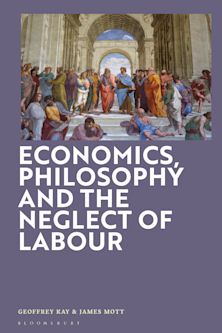- Home
- ACADEMIC
- Philosophy
- Social and Political Philosophy
- From Yugoslav Praxis to Global Pathos
From Yugoslav Praxis to Global Pathos
Anti-Hegemonic Post-post-Marxist Essays
From Yugoslav Praxis to Global Pathos
Anti-Hegemonic Post-post-Marxist Essays
For information on how we process your data, read our Privacy Policy
Thank you. We will email you when this book is available to order
You must sign in to add this item to your wishlist. Please sign in or create an account
Description
McBride offers a significant critical intervention into what is now recognized as a largely post-Marxian, at times liberal and at times conservative, spirit of the day, an intervention marked by writing against the post-Marxist hegemonic mainstream. Just as the Yugoslav philosophers did in their heyday ( from the Korcula Summer School to the gatherings at Dubrovnik's Inter-University Center), so too does McBride accentuate praxis as well as theoretical reflection on the present age. This marks his work with the pathos of a living philosophy. Like his previous volume, Philosophical Reflections on the Changes in Eastern Europe (Rowman & Littlefield, 1999), this book undertakes a most important goal, namely, to offer an informed critical assessment of Central and Southern Europe. But unlike its predecessor, this book is distinguished by situating various discussions of globalizations and neonationalist wars against the backdrop of the history, development, and demise of Praxis Philosophy - the one-time bridge betweeen the progressive forces of former Yugoslavia and various East-West initiatives (e.g. the founding of the journal, Praxis International, which was changed to Constellations in the wake of civil war in Yugoslavia).
Table of Contents
Chapter 2 The Practical Relevance of Practical Philosophy: Philosophers' Impact on History
Chapter 3 Ideals and Reality Revisited: Praxis and Nationalism in Erstwhile Yugoslavia: A Tribute to Gajo Petrovic
Chapter 4 Markovic's Language and the Spirit of Community
Chapter 5 Global Injustices
Chapter 6 Capitalism and Socialism as Ideals and the New World Order: An American Perspective
Chapter 7 The Marxian Vision of a (Better) Possible Future: End of a Grand Illusion?
Chapter 8 The Pathos of European Political Philosophy after Marxism
Chapter 9 Rethinking Democracy in Light of the East European Experience
Chapter 10 The Philosophy of Marx in the Wake of 1989: A New Appraisal
Chapter 11 Rights in the Context of 'One World': From Wendell Willkie to the Present
Chapter 12 Clarifying 'Civil Society' and Creating Space for Civil Societies: From the Struggle against Nation-State Despotisms to the Critique of Despotic Transnationalisms
Chapter 13 Coca-Cola Culture and Other Cultures: Against Hegemony
Chapter 14 Consumerist Cultural Hegemony within a Cosmopolitan Order - Why Not?
Chapter 15 What Values Remain?
Chapter 16 Habermas and the Marxian Tradition
Chapter 17 The Globalization of Philosophy
Chapter 18 Appendix: Review Essay
Product details
| Published | 27 Aug 2001 |
|---|---|
| Format | Ebook (Epub & Mobi) |
| Edition | 1st |
| Extent | 272 |
| ISBN | 9780742581036 |
| Imprint | Rowman & Littlefield Publishers |
| Series | New Critical Theory |
| Publisher | Bloomsbury Publishing |
About the contributors
Reviews
-
Drawing on the best of Hegel, the Marxian legacy, Sartre, and American Pragmatism as well as on his own rich experience in Western and Eastern Europe, William McBride has written a splendid and challenging volume. He skillfully assesses slogans such as 'post-Marxism,' 'human rights,' 'civil society,' 'the clash of civilizations,' and 'globalization;' excoriates U.S. consumerism, NATO's bombing of Yugoslavia, and Northern hegemony over the South; identifies serious flaws in the political philosophies of Habermas, Rawls, and Rorty; and adumbrates an appealing alternative that is democratic, pluralistic, cosmopolitan, and hopeful.
David A. Crocker, University of Maryland at College Park
-
Masterful, coherent and insightful collection.
William Alejandro Martin, McMaster University
-
This important book should be read by everybody interested in critical philosophical and social-scientific examination of globalization and its hegemonic political, economic, ideological and cultural tendencies.
Svetozar Stojanovic, The Institute for Philosophy and Social Theory, University of Belgrade



































